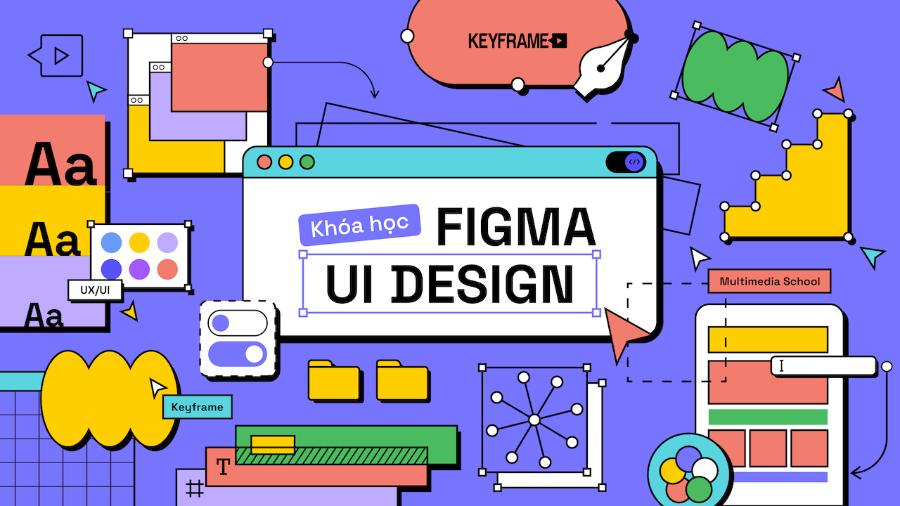Best Selling Products
What is Figma? Guide to Choosing the Best Figma Course for Beginners
Nội dung
- 1.What is Figma? Why You Should Learn Figma Today
- 2. What is Figma? Outstanding Features of Figma
- 2.1. Real-Time Design and Editing
- 2.2. Auto Layout Feature
- 2.3. Components và Variants
- 2.4. Diverse Plugin Integration
- 2.5. Sharing and Commenting Mode
- 3. Why Should You Learn Figma?
- 3.1. Figma Is Becoming the Industry Standard
- 3.2. Figma Supports Effective Teamwork
- 3.3. Easy to Learn, Easy to Use
- 3.4. Integrate Important Tools
- 3.5. Learning Figma Expands Career Opportunities
- 4. How to Choose the Best Figma Course for Beginners
- 4.1 Identify learning goals
- 4.2 Learn the course content
- 4.3 Reviews from previous learners
- 4.4 Choose experienced instructors
- 4.5 Flexible learning format
- 4.6 Reasonable cost
- 5. Which Figma Course Should Beginners Take?
- 5.1. Figma Basics Course For Beginners (Udemy)
- 5.2. UI/UX Design Course with Figma (Coursera)
- 5.3. Figma for Beginners (Skillshare)
- 6. Conclusion
Learn what Figma is and why it's a top choice for UI/UX design. Discover the best Figma courses for beginners to quickly master the tool.

In the era of constantly developing technology, the use of user interface (UI) and user experience (UX) design tools is becoming more and more popular. One of the most prominent tools today is Figma. If you are a beginner and are looking for a guide to choosing the right Figma course, this article by sadesign will provide you with the necessary information.
1.What is Figma? Why You Should Learn Figma Today
Over the past few years, Figma has become the most popular UX/UI design tool among designers. Figma is an online graphic design software that supports real-time team collaboration, allowing multiple people to work on a project without the synchronization issues of traditional design tools.
.jpg)
With powerful features such as vector design, easy-to-use interface, online collaboration support, and built-in powerful tools for usability testing, Figma has helped designers save time and improve work efficiency. Therefore, learning Figma is an important step if you want to enter the UX/UI design industry, develop professional skills, and optimize your design workflow.
2. What is Figma? Outstanding Features of Figma
Figma is a user interface (UI) and user experience (UX) design tool developed to help designers work more efficiently. It has many special features that make designing and collaborating easy, without having to switch back and forth between different applications. Here are the outstanding features of Figma:
2.1. Real-Time Design and Editing
One of the biggest advantages of Figma is the ability to collaborate in real time. Design team members can work on the same file, view it, and make changes immediately without having to worry about version control. This is especially important when working with a remote team or when team members need to contribute ideas immediately.
2.2. Auto Layout Feature
Auto Layout is a powerful feature that automatically adjusts the size and layout of interface elements as content or screen size changes. This is especially useful when designing interfaces for multiple devices, as it saves designers time and makes it easier to create responsive interfaces.
2.3. Components và Variants
Figma lets you create reusable components that help maintain design consistency. For example, you can create a button or icon and use it multiple times throughout your project. Variants let you change a component’s properties without having to recreate it from scratch, saving you time and avoiding duplicate work.
2.4. Diverse Plugin Integration
Figma has a rich plugin system that supports users in many different aspects of design, from creating images, searching for resources, to tools that assist in detecting and fixing design errors. These plugins help optimize the design process and help you work more efficiently.
2.5. Sharing and Commenting Mode
Figma also supports sharing and commenting, making it easy for designers to get feedback from colleagues or clients. You can share your design files for everyone to see and add comments directly on design elements.
3. Why Should You Learn Figma?
.jpg)
If you are new to UX/UI design, learning Figma will help you quickly grasp the essential skills to work effectively with modern design tools. Here are some reasons why you should learn Figma:
3.1. Figma Is Becoming the Industry Standard
Figma has become a popular design tool among tech companies, especially those developing digital products and services. From startups to large corporations like Google, Microsoft, and Uber, Figma is used in their product design process.
3.2. Figma Supports Effective Teamwork
With real-time collaboration, Figma makes it easy for remote or geographically dispersed teams to coordinate and contribute ideas, which is important if you want to work in a professional design environment.
3.3. Easy to Learn, Easy to Use
Figma has an intuitive user interface that is easy to learn and use, even if you have no experience in graphic design. You can quickly start creating basic designs, and gradually get acquainted with advanced features.
3.4. Integrate Important Tools
Figma supports many useful tools in interface design, including vector drawing tools, shape creation tools, color editing, and grid settings that make interface design easier than ever.
3.5. Learning Figma Expands Career Opportunities
Mastering Figma will open up career opportunities in the UX/UI design industry, as Figma is a tool used by many companies. Having Figma in your skill set will help you land jobs and advance your design career.
4. How to Choose the Best Figma Course for Beginners
.jpg)
There are many Figma courses offered by online education platforms and training centers today. However, not all courses are suitable for your needs. Here are some criteria to choose the best Figma course:
4.1 Identify learning goals
First, you need to clearly define your goals when learning Figma:
- Do you want to learn to get familiar with the tool or to become a professional designer?
- Do you need basic or in-depth knowledge of UI/UX?
Defining your goals will help you choose a course that suits your individual needs.
4.2 Learn the course content
A quality course should include basic content such as:
- Introduction to Figma and how to use the interface.
- Practice creating wireframes and prototypes.
- Basic UI/UX design techniques.
- How to use advanced features like Auto Layout, Variants, or plugins.
If the course offers additional practical exercises or a final project, this would be a big plus.
4.3 Reviews from previous learners
Before signing up, check out reviews from people who have taken the course. Platforms like Udemy, Coursera, or Kyna often have student reviews for you to check out.
4.4 Choose experienced instructors
The instructor is a key factor in determining the quality of the course. Find out about the instructor’s work and teaching experience. An instructor with a solid background in UI/UX design will bring more practical value.
4.5 Flexible learning format
For beginners, online courses are often the best choice because of the flexibility of time and location. You can study anytime, anywhere without being tied to a fixed schedule.
4.6 Reasonable cost
Finally, consider the cost of the course. There are plenty of free or cheap resources on the market, but sometimes investing in a high-quality course will pay off in the long run.
5. Which Figma Course Should Beginners Take?
With Figma growing so rapidly, there are a lot of courses available for beginners. Figma courses vary in content and level of detail depending on your learning goals and readiness. Here are the best Figma courses for beginners.
.jpg)
5.1. Figma Basics Course For Beginners (Udemy)
The Figma Basics course on Udemy is a great option for those who want to get started with Figma. This course covers the basics of using Figma, from creating frames to using components, Auto Layout, and more. The course content is easy to understand and suitable for beginners.
Advantages: Reasonable price, professional instructors, study anytime, anywhere.
Target audience: Beginners, people who want to learn quickly and self-study.
5.2. UI/UX Design Course with Figma (Coursera)
This course is designed to help learners master the entire UI/UX design process using Figma, from building wireframes, to detailed interface design and prototyping. This course also helps you develop your design and usability testing skills.
Advantages: Full and in-depth lesson content, helping to develop comprehensive UI/UX skills.
Target audience: Beginners who want to learn UI/UX and Figma.
5.3. Figma for Beginners (Skillshare)
The Figma for Beginners course on Skillshare helps beginners quickly understand and use Figma to design beautiful interfaces. The course will guide you through every step of the design process, from starting a project to creating reusable components and building basic interface prototypes.
Pros: Lessons are accessible, no prior experience required.
Target audience: Beginners, no design knowledge required.
6. Conclusion
Figma is a powerful and easy-to-use design tool, suitable for both beginners and professional designers. With the ability to support real-time collaboration and many powerful design features, Figma is becoming an indispensable part of the digital product design process. Contact Sadesign now to be provided with genuine Figma software at a super cheap price!












































